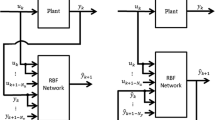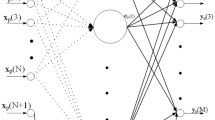Abstract
This paper analyzes various formulations for the recursive training of neural networks that can be used for identifying and optimizing nonlinear processes on line. The study considers feedforward type networks (FFNN) adapted by three different methods: inverse Hessian matrix approximation, calculation of the inverse Hessian matrix using a Gauss-Newton recursive sequential algorithm, and calculation of the inverse Hessian matrix in a recursive type Gauss-Newton algorithm. The study is completed using two network structures that are linear in the parameters: a radial basis network and a principal components network, both trained using a recursive least squares algorithm. The corresponding algorithms and a comparative test consisting of the on-line estimation of a reaction rate are detailed. The results indicate that all the structures were capable of converging satisfactorily in a few iteration cycles, FFNN type networks showing better prediction capacity, but the computational effort of the recursive algorithms is greater.
Preview
Unable to display preview. Download preview PDF.
Similar content being viewed by others
References
Hornik, K., Stinchcombe, M., White, H.: Multilayer Feedforward Networks are Universal Approximators. Neural Network 2, 359–366 (1989)
Ge, S.S., Hang, C.C., Lee, T.H.: Stable Adaptive Neural Network Control. Springer, Heidelberg (2002)
Zhang, T., Ge, S.S., Hang, C.C.: Adaptive Neural Network Control for Strict Feed-back Nonlinear Systems using Backstepping Design. Automatica 36, 1835–1846 (2000)
Wilson, R., Martinez, T.: The General Inefficiency of Batch Training for Gradient Descent Learning. Neural Networks 16, 1429–1451 (2003)
Van der Smagt, P.: Minimisation Methods for Training Feedforward Neural Networks. Neural Networks 7, 1–11 (1994)
Peel, C., Willis, M., Tham, M.: A Fast Procedure for Training NN. J. Proc. Contr. 2 (1992)
Oja, E.: Principal Components, Minor Components and Linear Neural Networks. Neural Networks 5, 927–935 (1992)
Spooner, J.T., Passino, K.: Decentralized Adaptive Control of Nonlinear Systems Using Radial Basis Neural Networks. IEEE Transactions on Auto. Control 44, 2050–2057 (1999)
Moody, J., Darken, C.: Fast Learning in Networks of Locally Tuned Processing Units. Neural Computation 1, 281–294 (1989)
Chen, S., Billings, S., Grant, P.: Recursive Hybrid Algorithm for Non Linear System Identification using Radial Basis Functions Networks. Int. J. Control 55, 1051–1070 (1991)
Dhib, R., Hyson, W.: Neural Network Identification of Styrene Free Radical Polymerization. In: Polymer Reaction Engineering, USA, vol. 10, pp. 101–113 (2002)
Author information
Authors and Affiliations
Editor information
Editors and Affiliations
Rights and permissions
Copyright information
© 2006 Springer-Verlag Berlin Heidelberg
About this paper
Cite this paper
Cubillos, F., Acuña, G. (2006). Simulation Studies of On-Line Identification of Complex Processes with Neural Networks. In: Wang, J., Yi, Z., Zurada, J.M., Lu, BL., Yin, H. (eds) Advances in Neural Networks - ISNN 2006. ISNN 2006. Lecture Notes in Computer Science, vol 3972. Springer, Berlin, Heidelberg. https://doi.org/10.1007/11760023_120
Download citation
DOI: https://doi.org/10.1007/11760023_120
Publisher Name: Springer, Berlin, Heidelberg
Print ISBN: 978-3-540-34437-7
Online ISBN: 978-3-540-34438-4
eBook Packages: Computer ScienceComputer Science (R0)




